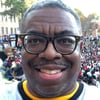Ryan Peterson’s turning point came four months ago. He was homeless, estranged from his family, HIV-positive and bingeing on $300 worth of meth a day.
So, on a recent day, when he bounced into work at the Lost-n-Found Thrift and Consignment shop off Cheshire Bridge Road, he had reason to celebrate.
“As of today, I am four months sober off crystal meth,” Peterson, 23, said to everyone and no one in particular. A co-worker, Rachel Williams, hugged him (although she seemed more interested in the chains dangling from the choker around his neck).
Lost-n-Found is an Atlanta-based outreach program that houses and shelters youth and young adults who are lesbian, gay, bisexual or transgender. More than 450 kids have found their way to its tiny house in the West End since it was established in 2011. Co-founder Rick Westbrook believes they are a small fraction of the LGBT kids who need help.
“There was no place for them to go where they would be surrounded by people like them,” Westbrook said. “A lot of them are kicked out of their homes because of their sexuality.”
The nation got a glimpse of what that looks like recently when a video shot by 19-year-old Daniel Pearce went viral. The video has gotten more than 7 million hits on YouTube.
There are no solid figures on the number of youth who are homeless, but research consistently shows that a disproportionate share of them are LGBT. Mary Cunningham, a senior fellow with the Urban Institute, a Washington, D.C.-based think tank, said she has seen national estimates range from 40,000 on any given night to 1.7 million.
“Homeless youth are trying to avoid detection,” said Cunningham. “Many are underage and don’t want to become wards of the state, get involved with the police, or return home.”
In 2013 YouthCount, a federal interagency initiative, did a count in six cities and estimated that gays make up 20 to 40 percent of the homeless youth population (compared to no more than 10 percent of the total youth population). Atlanta was not included in the survey.
Kelly Fields, executive director for StandUp For Kids, an Atlanta nonprofit that provides outreach for homeless and at-risk youths, said they see about 100 young people a month. About a quarter of them are LGBT.
“The numbers are low because youth don’t identify themselves as homeless,” she said, explaining that many are couch surfing. “We define them as at-risk because there is no guarantee where you are going to be tomorrow,” Fields said.
Lost-n-Found has only six beds, but a new nine-bedroom facility is being renovated in Midtown. “We stay full all of the time,” said Westbrook, looking over blueprints.
Westbrook, who is 51, said he stumbled across the problem facing homeless LGBT teens almost by accident. After losing a friend to AIDS, Westbrook hit the streets to talk to homeless men about safe sex and noticed the young and homeless.
Once in the program — where they stay for up to three months — the clients undergo HIV testing and health screenings. They also get job training and help securing vital documents such as Social Security cards and birth certificates.
About 70 percent of the kids who come through the program, and almost all of the youths who are transgender, are black. Roughly half are females.
Laura Gentle, the 32-year-old housemother, said about 30 percent of all of their clients have been HIV-positive and the disease is a constant presence.
“Living and working with them every day, you have to remove yourself from the pain,” Gentle said. “You have to learn how to turn that off or you will just be crying all day long.”
Peterson was out of options when he called Lost-n-Found in June.
“My friends got tired of me getting high, using an 8-ball of meth a day,” Peterson said. “I guess I was running away from being HIV (positive). I was running and had no place to go.”
He was 17 when he confronted his mother about his sexuality and bolted from home — getting lost in the process. He fled to California but just ended up doing a lot of porn. In March 2011, someone put a knife against his narrow neck and raped him in a back alley.
“As far as I know, that is when I got HIV,” Peterson mused.
He came to Atlanta and started dating a meth dealer. Addiction, fights and jail followed before he finally called Westbrook.
“When I came to Lost-n-Found, I sat in this very room and said, ‘This is my life. I want to know what to do with it. I need help.’” Peterson said. “They helped me get purpose back in my life.”
The agency’s thrift store became a rare constant for Peterson.
His boss, Brad Thornton, is 33 and looks like a youth minister, but Thornton said he was “one of those kids, homeless on the streets,” who coped by “getting into drugs, alcohol and prostitution.”
“When I was 15, I came home and told my parents I was gay,” said Thornton, who is from Columbus. “I was kicked out of the house by 6 p.m.”
He came to Atlanta and within days was using drugs. Two weeks later he was selling his body. He never went back home.
“My addiction took me so far under that I didn’t know what was going on,” said Thornton, who got clean five years ago. “I didn’t have anything like Lost-n-Found. That is why I am here for these kids. I am pretty outspoken and I tell them what they need to hear.”
In the heart of Midtown, workers are frantically renovating and restoring a historic 110-year-old mansion on Juniper Street that will replace the West End house as early as March. Lost-n-Found is leasing the building for $1 a year from St. Mark United Methodist Church.
It will take about $300,000 to fully renovate the facility that will house 18 kids in nine bedrooms. The youth center and processing station, now located at the thrift store, will also relocate to Juniper.
“We need to be here,” Westbrook said from the home’s massive porch, where one can sit at night and watch gay male prostitutes — many in the demographic he is trying to help — stroll. “In the middle of everything.”
About the Author






